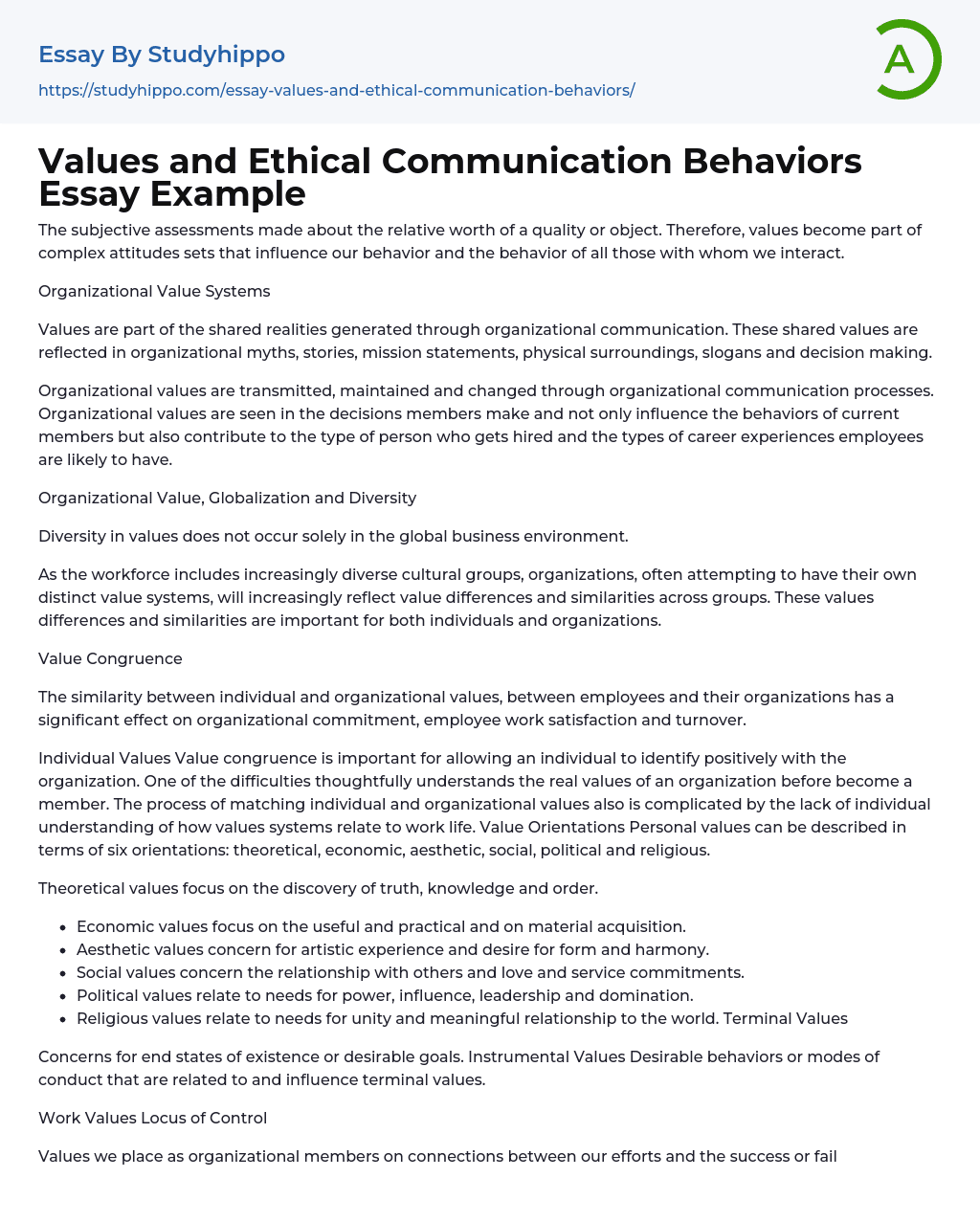The subjective assessments made about the relative worth of a quality or object. Therefore, values become part of complex attitudes sets that influence our behavior and the behavior of all those with whom we interact.
Organizational Value Systems
Values are part of the shared realities generated through organizational communication. These shared values are reflected in organizational myths, stories, mission statements, physical surroundings, slogans and decision making.
Organizational values are transmitted, maintained and changed through organizational communication processes. Organizational values are seen in the decisions members make and not only influence the behaviors of current members but also contribute to the type of person who gets hired and the types of career experiences employees are likely to have.
Organizational Value, Globalization and Diversity
Diversity in values does not occur solely in the global business environment.
As the workforce includes increasingly diverse cultural groups, organizations, oft
...en attempting to have their own distinct value systems, will increasingly reflect value differences and similarities across groups. These values differences and similarities are important for both individuals and organizations.
Value Congruence
The similarity between individual and organizational values, between employees and their organizations has a significant effect on organizational commitment, employee work satisfaction and turnover.
Individual Values Value congruence is important for allowing an individual to identify positively with the organization. One of the difficulties thoughtfully understands the real values of an organization before become a member. The process of matching individual and organizational values also is complicated by the lack of individual understanding of how values systems relate to work life. Value Orientations Personal values can be described in terms of six orientations: theoretical, economic, aesthetic, social, political and religious.
Theoretical values focus on the discovery of truth, knowledge an
order.
- Economic values focus on the useful and practical and on material acquisition.
- Aesthetic values concern for artistic experience and desire for form and harmony.
- Social values concern the relationship with others and love and service commitments.
- Political values relate to needs for power, influence, leadership and domination.
- Religious values relate to needs for unity and meaningful relationship to the world. Terminal Values
Concerns for end states of existence or desirable goals. Instrumental Values Desirable behaviors or modes of conduct that are related to and influence terminal values.
Work Values Locus of Control
Values we place as organizational members on connections between our efforts and the success or failure of the organization. Self-esteem Value we place on recognition for work, positive feedback and the use of our contributions.
Tolerance of Ambiguity
Value or importance we place on structured or unstructured work environments.
Social Judgment
Value we place on the feelings of others and our general assumptions about why people work. Risk Taking A value that explores the importance we place on quick rather than deliberative action and whether we prefer our own sense of job fulfillment as opposed to job security.
поправил
Ethics Moral principles that guide judgment about good and bad, right and wrong, not just effectiveness or efficiency. Our values influence what we will determine to be ethical. Values are our measures of importance; ethics represent our judgment about right and wrong.
This close relationship between importance and right and wrong is thought to be powerful influence on our behavior and how we evaluate the behavior of others.
Making Ethical Decision
The area of ethics has emerged from three fundamental moral perspectives. Each theory evaluates the morality of an action based on certain criteria. First,
utilitarian theory evaluates behavior based on outcomes or consequences for those involved. Second, theory of right emphasized individuals’ entitlement or privileges as members of a society. Lastly, a theory of justice emphasized balance or equity.
- Perseverance essays
- Expressive essays
- Character Traits essays
- Apology essays
- Compassion essays
- Greeting essays
- Orality essays
- Intercultural Communication essays
- Interpersonal Communication essays
- Cross-Cultural Communication essays
- Nonverbal Communication essays
- Effective Communication essays
- Communication Skills essays
- Values of Life essays
- Ethical dilemma essays
- Normative Ethics essays
- Virtue Ethics essays
- Belief essays
- Deontology essays
- Moral essays
- Virtue essays
- Work Ethic essays
- Adult essays
- Aggression essays
- Altruism essays
- Archetype essays
- Behavior essays
- Certainty essays
- Conformity essays
- Deception essays
- Human Behavior essays
- Human Sexuality essays
- Maturity essays
- Morality essays
- Obedience essays
- Procrastination essays
- Reinforcement essays
- Role Model essays
- Arranged Marriage essays
- Communication essays
- Conflict Management essays
- Conflict Resolution essays
- Connection essays
- Conversation essays
- Dating essays
- Friendship essays
- Mediation essays
- Acceptance essays
- Age Of Enlightenment essays
- Child Observation essays




